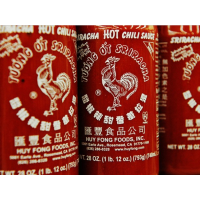Judge Denies City Lawsuit over Sriracha Hot Sauce Factory that Has Nearby Residents Burning

Sriracha hot sauce lovers sighed with relief—although it could have just been gastroesophageal reflux —when a judge Thursday denied the city of Irwindales’s request to shut down a chiles-fueled factory over complaints of noxious neighborhood gases.
Los Angeles County Superior Court Judge Robert O’Brien denied a request for a temporary restraining order that would have shut down the factory owned by Huy Fong Foods until complaints by residents were addressed. The city filed its request after residents said they suffered headaches, burning eyes and sore throats.
Around 30 residents have complained to the city, although reporters talked to some neighbors who didn’t detect any smell. Ruby Sanchez was not one of them. She told the Associated Press, “It's like having a plate of chili peppers shoved right in your face.”
The 2-year-old, 650,000-square-foot factory was built with the help of city redevelopment funds and processes 100 million pounds of peppers a year in producing the company’s wildly popular hot sauce and two other Asian food sauces. Around 40 trucks a day drop off millions of jalapeno peppers that are crushed and mixed with other spices along a conveyer belt.
The company installed filters at the plant after initial complaints that the smell of peppers and garlic were bothering neighbors. When that failed to relieve residents, the city suggested that a $600,000 advanced filtration system be added, but the company balked.
Upon news of the possible factory shutdown, the media warned of price hikes and advised fans on how to survive without the condiment. The Atlantic, its spicy tongue firmly pressed against its blistered cheek, warned of a black market forming and suggested that “hoarding and selling bottles wouldn’t be a bad idea.” The AP described Sriracha as “so fiercely hot it makes Tabasco and Picante seem mild, though to those with fireproof palates and iron stomachs it is strangely addicting.”
The company argued in court that shutting it down now would be a hardship because the plant is at the end of its harvesting and processing cycle, which lasts about three months out of the year. A lawyer for the company also argued that shutting the factory down now would prevent the South Coast Air Quality Management District (AQMD) from finishing an ongoing assessment of the plant’s filtration system, according to the Los Angeles Times.
The city reportedly has a preliminary injunction request pending that is scheduled to get a hearing on November 22, and, if that fails, has also filed for a permanent injunction.
–Ken Broder
To Learn More:
The Days of a Sriracha Black Market Are Approaching (by Alexander Abad-Santos, The Atlantic)
Sriracha Hot Sauce Factory Operations May be Halted by Irwindale, Sources Say (by Sarah Favot, San Gabriel Valley Tribune)
Sriracha Hot Sauce Factory Becomes a Victim of Its Own Success as Neighbors Complain (by John Rogers, Associated Press)
Sriracha Fight: Irwindale Officials Not Backing Down after Ruling (by Frank Shyong, Los Angeles Times)
California Town Sues Sriracha Chili Sauce Factory over Smell (by Cheryl K. Chumley, Washington Times)
California City Sues over Cloud of Sriracha (by Reid Wilson, Washington Post)
- Top Stories
- Controversies
- Where is the Money Going?
- California and the Nation
- Appointments and Resignations
- Unusual News
- Latest News
- California Forbids U.S. Immigration Agents from Pretending to be Police
- California Lawmakers Urged to Strip “Self-Dealing” Tax Board of Its Duties
- Big Oil’s Grip on California
- Santa Cruz Police See Homeland Security Betrayal in Use of Gang Roundup as Cover for Immigration Raid
- Oil Companies Face Deadline to Stop Polluting California Groundwater





